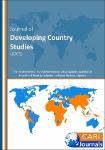The involvement of Non-Governmental Organizations activities in Household Poverty reduction in Oyam District, Uganda
Abstract
Purpose: This study examined the contribution of NGO activities on poverty reduction in Oyam District-Northern Uganda and recommends strategies for improving wellbeing of people of the region and entirely Uganda as a Country. This was based on account that, Oyam District was estimated with the lowest annual GDP per capita of 223 USD compared to the neighbouring Districts of Apac and Kole with the annual GDP per capita of 228 USD and 230 USD respectively
Methodology: The study used a correlational design with correlational and regression methods of analysis. It was conducted among beneficiaries of selected NGOs comprising a sample of 290 from a population of 860.
Findings: This study reveals a significant and positive contribution of NGO activities to poverty reduction in Oyam District and that NGO activities has a moderate relationship with household poverty level in Oyam District. The results further show that the financial support provided by NGOs significantly contributes to poverty reduction while the food security support provided does not.
Conclusion and recommendations: It is established that NGO activities contribute significantly to poverty reduction in Oyam District. This study recommends that the food security support be backed with the provision of market for the agricultural products of the NGO beneficiaries and in order to create income for them. The study further recommends for the NGO support to agricultural product market search for their beneficiaries as well as forming the beneficiaries in different groups and train them on financial literacy for better management of finances.
Unique contributions to policy and/or practice: This study contributes positively to the understanding of non-state actors and the role they play in reducing poverty among communities that are recovering from decades of civil war in Uganda.
Collections
- Research Articles [139]

